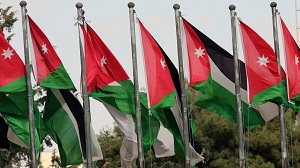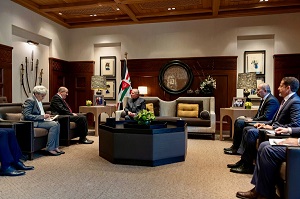Zaatari refugees torn between revolution, security

Hana Namrouqa, The Jordan Times
MAFRAQ — While hundreds of Syrians fleeing the violence in their country arrive at the Zaatari Refugee Camp daily, some camp residents want to return to their homeland for various reasons.
Several Syrians interviewed by The Jordan Times last week complained that their requests to be sent back to Syria are taking too long to be processed, adding that the camp administration takes up to 12 days to process their petitions.
Hatem, who preferred to be identified by his first name fearing retaliation by the Syrian regime against his relatives in Syria, said wants to go back and “join the revolution” as the current situation in his country is “different”.
“When I decided to flee to Jordan, I was only thinking about my family’s safety,” said the father of two boys.
“When we left Syria five months ago the Free Syrian Army had a shortage of arms. Had we stayed in Syria, we would have been a burden,” he said.
“Now, they have got the weapons. I can join their ranks to fight against the oppressive regime.”
Several other Syrians, who declined to be named for security reasons, told The Jordan Times that they want to join the rebel forces now that they are armed.
Iman Shugran, who lives with her husband and their three daughters at Zaatari, said that she feels a lack of security in the camp, since it “houses Syrians from diverse backgrounds in the same location”.
“We would rather be in Syria. We can help the wounded or provide the fighters with food and water instead of living here. We never thought our lives would be like this,” she added.
Shugran said that she had applied to go back over a week ago but has not received a response so far.
Public Security Department officer Col. Zaher Abu Shihab told The Jordan Times last week that a new administration consisting of police personnel is now in place to “help improve law and order” in the camp.
He added that the new administration receives “anything between 50 to 100” applications daily from people who want to go back to Syria, but letting them leave depends on the situation at the border.
He noted that two or three buses, carrying about 160-170 refugees returning to Syria, leave the camp each day.
More than 8,000 people crossed into Jordan last week. At the moment, there are more than 80,000 people in the camp. It has become a “society”, including even “bad” elements.
Abu Shihab said Jordanian law governs the camp, and that criminals “will be sent to court” accordingly.
According to Brig. Gen. Hussein Zyoud, Border Guards commander, children constitute around 42 per cent of the total number of refugees, followed by women (36 per cent) and men (22 per cent).
Jordan Hashemite Charity Organisation representative Mahmoud Omoush, director of the camp, told The Jordan Times last week that around 14,377 residents had left the camp after getting Jordanian guarantors, while 11,473 went back to Syria.
“Syrians are starting to cope with life here. We are trying to encourage them to start working inside the camp,” Omoush said.
He added that 600 residents now work with several NGOs within the camp.
The security situation, while not ideal, is getting better because people are “accepting the situation”, according to Omoush.“Our first priority,” he said, “is to improve the security situation. Security is why they chose to come here.”




